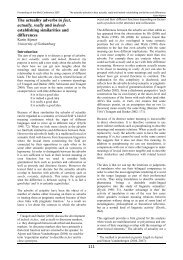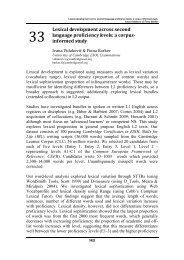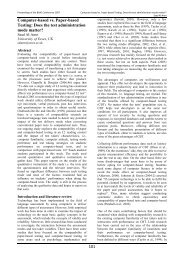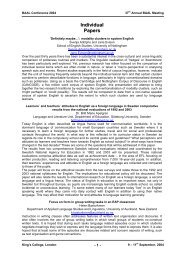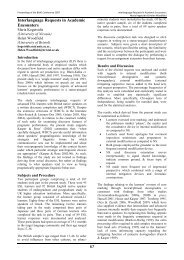Proceedings of the - British Association for Applied Linguistics
Proceedings of the - British Association for Applied Linguistics
Proceedings of the - British Association for Applied Linguistics
You also want an ePaper? Increase the reach of your titles
YUMPU automatically turns print PDFs into web optimized ePapers that Google loves.
43<br />
<strong>British</strong> <strong>Applied</strong> <strong>Linguistics</strong>: impacts <strong>of</strong> and impacts on<br />
Guy Cook<br />
Take clinical linguistics <strong>for</strong> example. This is not usually listed as an area <strong>of</strong><br />
applied linguistics, nor one whose practitioners necessarily see <strong>the</strong>mselves<br />
as applied linguists. Yet by Brumfit's definition it is surely archetypal<br />
applied linguistics when it interprets academic findings <strong>for</strong> <strong>the</strong> pr<strong>of</strong>essional<br />
practice <strong>of</strong> speech <strong>the</strong>rapy, and mediates between <strong>the</strong>m and <strong>the</strong> practical<br />
concerns <strong>of</strong> patients and <strong>the</strong>ir families. There can be little doubt that speech<br />
<strong>the</strong>rapy does a great deal <strong>of</strong> good in <strong>the</strong> world, helping children and adults<br />
with speech and communication impairment. Clinical linguistics is surely<br />
an example <strong>of</strong> an applied linguistics at its best, and both applied linguistics<br />
at large and clinical linguistics itself would benefit greatly if this were<br />
widely recognised.<br />
Or take deaf linguistics – an area <strong>of</strong> enquiry which is listed in <strong>Applied</strong><br />
<strong>Linguistics</strong>. This is surely an area where <strong>the</strong>oretical and empirical<br />
investigation has had a very positive influence on a very practical problem:<br />
namely misconceptions and prejudices about deaf sign languages.<br />
Linguistic evidence has been deployed to show decisively that sign<br />
languages are as complex - in some ways even more complex - than spoken<br />
languages (Sutton-Spence and Woll 1999). Indeed, this is a battle which<br />
has largely been won, in that deaf sign languages are now widely respected<br />
and recognised <strong>for</strong> what <strong>the</strong>y are.<br />
So within <strong>the</strong> broad conception <strong>of</strong> contemporary applied linguistics, <strong>the</strong>re<br />
have definitely been cases <strong>of</strong> positive influence. O<strong>the</strong>rs examples are<br />
<strong>for</strong>ensic linguistics, medical communication, and workplace<br />
communication. Indeed even in <strong>the</strong> applied linguistics heartland <strong>of</strong><br />
language teaching <strong>the</strong>re are moves to create approaches which seek to<br />
preserve and integrate students' own linguistic and cultural identity ra<strong>the</strong>r<br />
than banish <strong>the</strong>m from <strong>the</strong> classroom as be<strong>for</strong>e (Cooke and Simpson 2008,<br />
Hall and Cook 2012).<br />
But notice a trend. These areas <strong>of</strong> greatest influence (which could be<br />
described as impact <strong>for</strong> <strong>the</strong> REF) tend to be dealing with language and<br />
communication at <strong>the</strong> micro level: a child with a <strong>the</strong>rapist, a deaf person in<br />
conversation, a doctor with a patient. The picture is less rosy, however,<br />
when we think <strong>of</strong> applied linguistics striving <strong>for</strong> influence on larger stages<br />
– <strong>for</strong> example language planning and legislation, language education policy<br />
or <strong>the</strong> use <strong>of</strong> language in political and public debate. Take <strong>for</strong> example, in<br />
<strong>the</strong> UK, <strong>the</strong> discourse around demands <strong>for</strong> English language pr<strong>of</strong>iciency as<br />
a precondition <strong>for</strong> <strong>British</strong> citizenship, <strong>the</strong> ending <strong>of</strong> <strong>the</strong> compulsory study



